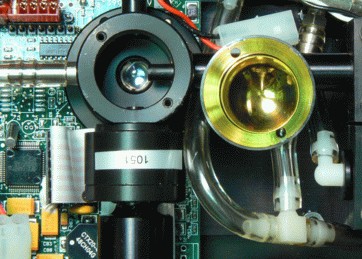Two strange cases: Yufa v. Lockheed Martin and Yufa v. Hach Ultra-Analytics
Posted : 8 years, 5 months ago

This was quite an unusual situation. Dr. Aleksandr L. Yufa had several patents relating to optical particle counting, and tried to get various companies to license them. I don't know if any actually signed up, but obviously some didn't, because he sued several manufacturers and users of these technologies for infringement. The unusual part was that Dr. Yufa was acting pro se, that is, he was acting as his own lawyer.
I was retained as testifying expert by defense counsel in two of these cases: Yufa v. Lockheed-Martin and Yufa v. Hach Ultra-Analytics. An inter partes review had significantly narrowed the scope of Dr. Yufa's patents. After reviewing the schematics, mechanical drawings, and source code for the accused instruments, and doing a bunch of reverse engineering and data-taking, I was able to demonstrate that there was no infringement of the remaining claims. The Court agreed, and granted the motion of summary judgment in favour of Lockheed-Martin. This was especially satisfying because the case had been in litigation for six years by the time I got involved, and a previous motion for summary judgment had been denied. Summary judgment was also granted in the Hach case, based on the same evidence.
Dr. Yufa appealed the Lockheed case and one other all the way to the Federal Circuit, and lost both. The lower court awarded partial attorney's fees to the defendant, which (according to publicly-available court documents) Dr. Yufa was apparently unable to pay, resulting in his patents being assigned to a court-designated receiver. He appealed that ruling and lost again, so he applied for a writ of certiorari to the US Supreme Court, which was denied, making a fitting though rather sad end to a strange case.
Dates: August - December 2013 (Lockheed); March - June 2014 (Hach)
Recent Posts
-
Featured Product: LA-22 Low Noise Lab Amplifier
-
 "Super-Regenerative Receivers" by J. R. Whitehead
"Super-Regenerative Receivers" by J. R. Whitehead -
Temperature Control 1: Simple Control Theory
-
A High-Performance Time Domain Reflectometer
-
Product Announcement: QL03 Photoreceiver
Archive
2026
- January (1)
2025
2023
- May (1)
2021
- January (3)
2020
2018
2017
2015
2014
2013
2012
2011
Categories
- Design Support Consulting (8)
- Expert Witness Cases (15)
- New Technology (1)
- News (33)
- Products (4)
- SED (16)
- Sensitive Design (6)
- Ultrasensitive Instrument Design (27)
Tags
- photon budget (1)
- prototype (1)
- SEM (2)
- microscopy (1)
- microscope (1)
- product (1)
- noise (2)
- ultraquiet (1)
- thermoelectric cooler (1)
- Jim Thompson (1)
- analog-innovationscom (1)
- analog (2)
- ic design (1)
- scielectronicsdesign (1)
- website archive (1)
- MC4044 (1)
- MC1530 (1)
- SiPm (2)
- MPPC (2)
- PMT (1)
- Photomultiplier (2)
- frontend (1)
- module (2)
- hammamatsu (1)
- APD (2)
- SPAD (2)